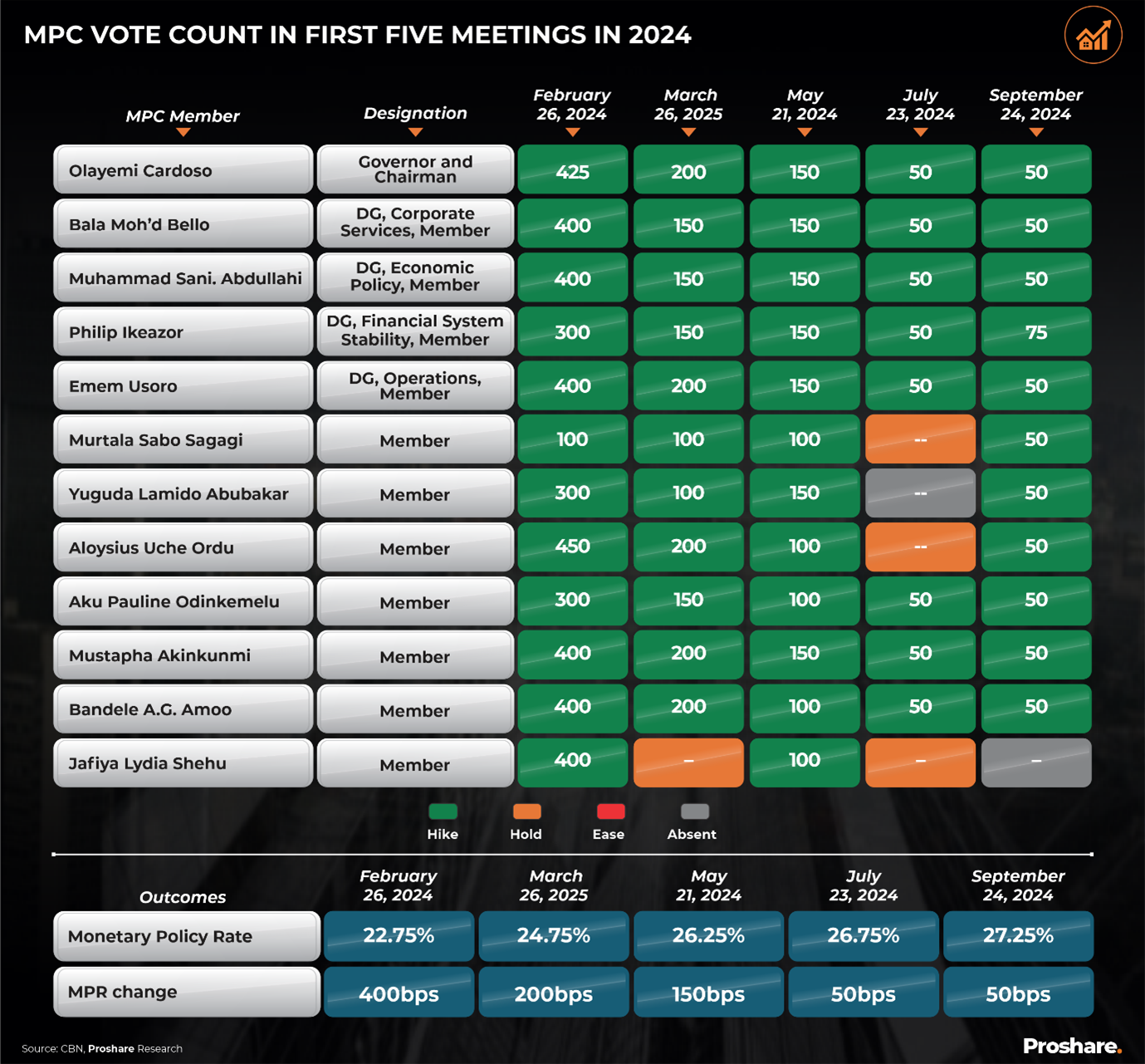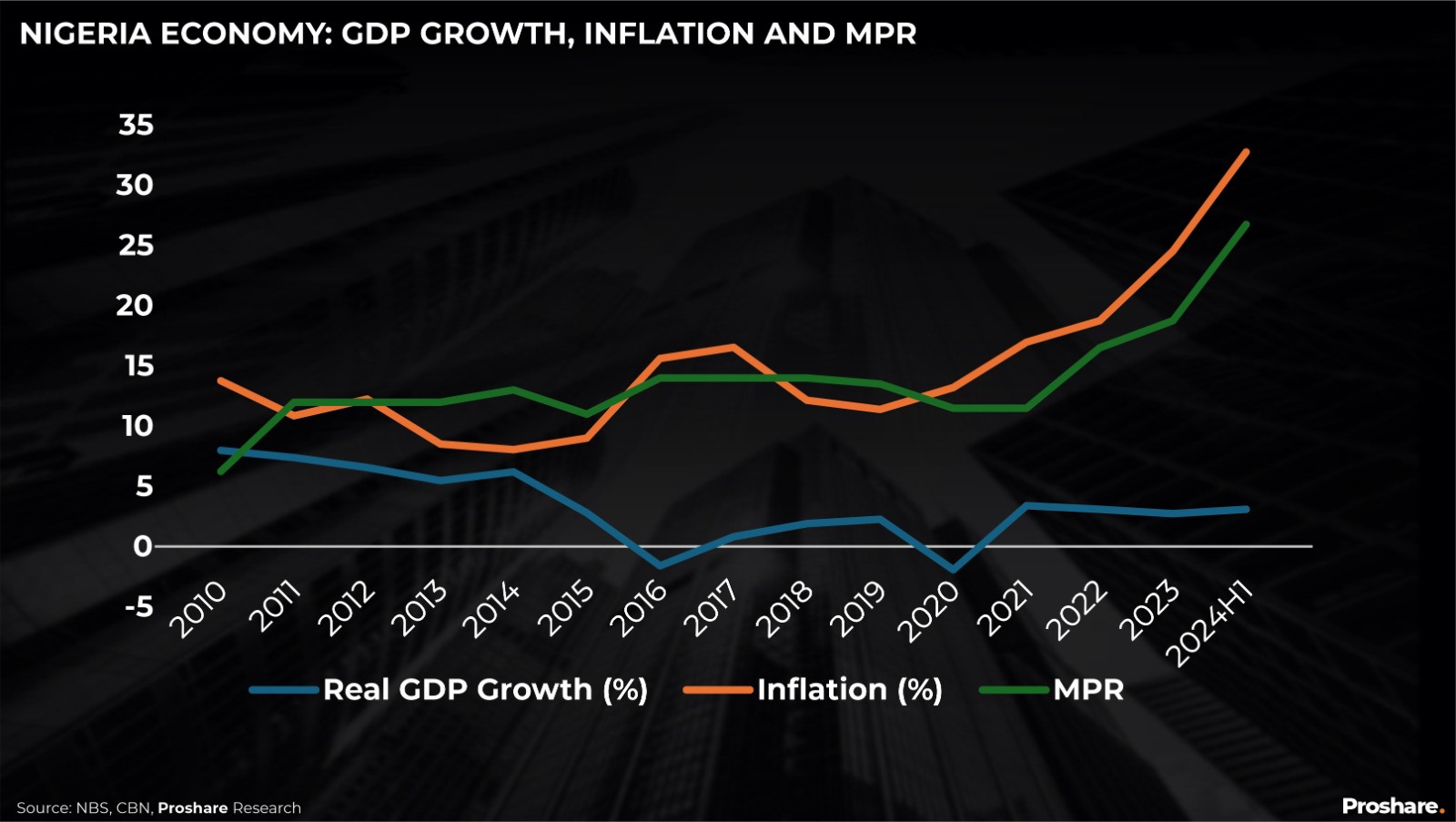Pre-CBN MPC Decision November 2024: With Inflation at 33.88%, the Next Tightening Beckons

Analysts’ Opinions
- We anticipate a highly probable hike of at least 25bps, reflecting the CBN MPC’s hawkish position.
- A hold on further rate hikes is, however, recommended by Proshare Analysts.
- Our previous position that the September 2024 rate hike will not adequately address the key considerations noted by the CBN MPC aligns with current realities.
The CBN MPC retained its hawkish stance in its September 26, 2024, meeting, tightening policy rates further by 50bps to bring the monetary policy rate (MPR) up to 27.25%. The unanimous decision revealed the dominance of hawks on the committee (see illustration 1 below).
Illustration 1:


Expectations of Capital Market Operators/Analyst for November 2024 MPC Meeting
Real estate market trends
Prof Uche Uwaleke
“I won’t be surprised if the MPC further jerks up the MPR by at least 50 basis points…Nevertheless, considering the rising cost of funds for businesses, I advise a hold position.”
Seyi Akinbi – Investment Analyst
“My take will be a 50bps hike in MPR + additional CRR increase to, say, 55% as the CBN continues a hiking spree to reign in inflation over the next few months. There is a real threat of inflation becoming entrenched in the Nigerian economy, and the CBN will need to continue these hikes to ensure real positive returns.”
Olutoyin Ayoade, MD, MBC Securities
“I expect them to hold fire at this point.”
David Adonri – Highcap Securities
“CBN has said that MPR will be raised as long as the inflation rate keeps increasing. However, one cannot predict how much the rate will be hiked.”
Considerations for MPR Hike in September 2024
In raising rates, the CBN MPC’s noted its primary considerations to include:
- Headline Inflation moderated in July and August 2024; however, energy costs continue to drive core inflation, leaving price levels elevated.
- Excess Liquidity driven by money supply must be curtailed
- Money supply growth remained high. Analysts note that money supply Increased by 64% from N66.17trn in September 2023 to N108.95trn in September 2024
- Higher Fiscal deficits in 9M 2024. However, ways and means will not be an option. Analysts note that public debt rose in Q2 2024 at N134trn ($91.35bn) from N87.40trn (US$113.42bn) in Q2 2023.
- Strong correlation between FAAC releases and liquidity levels in the banking system with possible implications on price levels to be monitored
- FX – the need to sustain confidence given Stable and converged exchange rates across market segments.
- Recognition of risks such as flood, insecurity, energy costs, and PMS scarcity as drivers of food inflation.
- Optimism that lifting refined petroleum products from the Dangote refinery will moderate transportation costs and food price pressures.
- The MPC’s concern is for medium- and long-term outcomes rather than immediate gains alone.
Closing Thoughts:
- Proshare analysts anticipate considerations like those observed in September 2024 be re-echoed as justification for another rate hike.
- We suggest a hold on further rate hikes but expect an additional rate increase of at least 25 basis points in November, reflecting the CBN MPC’s hawkish stance.
- We maintain that the prospects for the CBN’s September 2024 considerations being adequately addressed via rate hikes remain highly uncertain.
- We maintain that the CBN policy rate hikes may have a limited impact on containing inflation risks driven by structural factors such as insecurity, climate risks, PMS scarcity, and elevated energy costs.

- The CBN MPC considerations are silent and may remain so on the role of key data in its policy decision, such as the labour market data and purchasing managers’ index (PMI).
- The CBN has indicated that its interest rate policies have contributed to stabilising the exchange rate; however, we anticipate higher currency risks and advocate for a shift in focus towards strengthening the naira through increased foreign direct investment (FDI), net reserve accumulation and enhanced balance sheet performance through public asset financialisation strategies.




